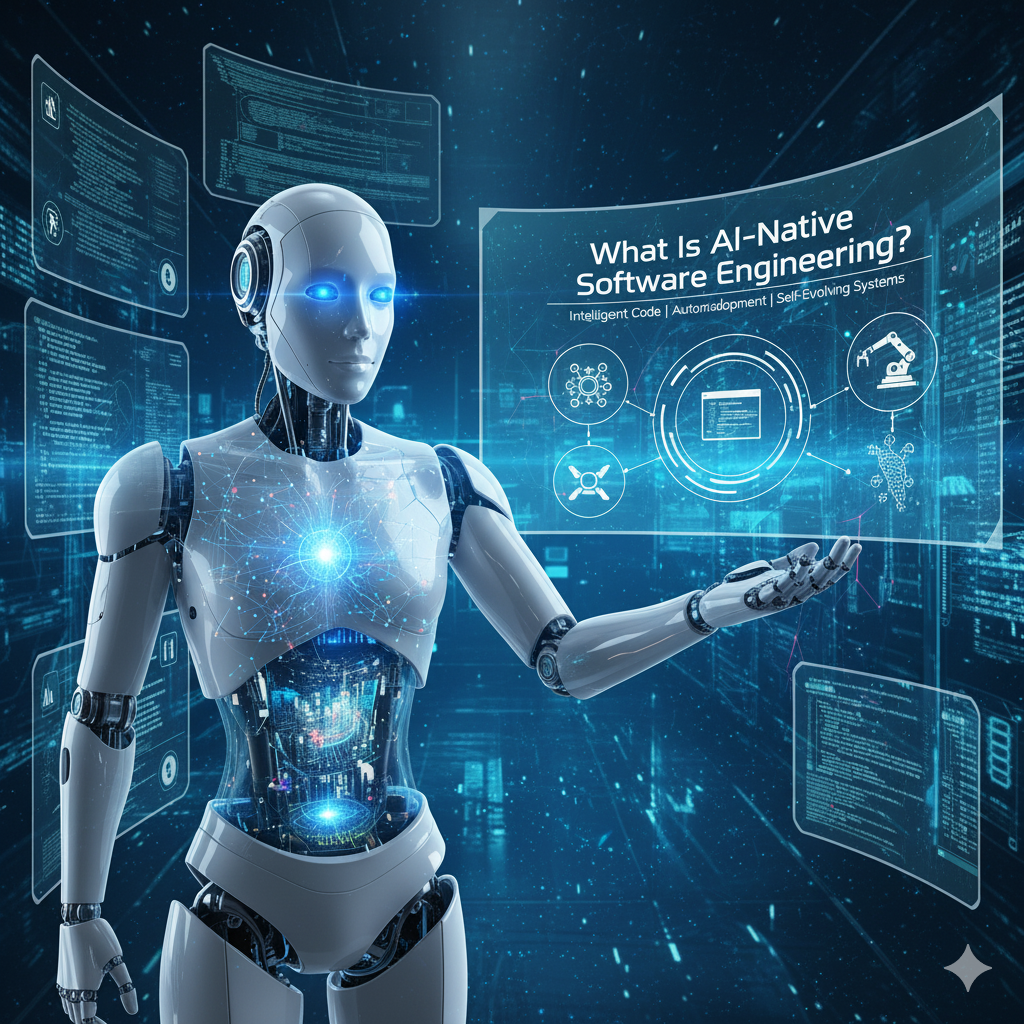🔍 Introduction: What Does “AI-Native” Mean?
The phrase AI-Native Software Engineering refers to creating software with artificial intelligence as its foundation — not just an add-on feature.
In earlier times, programmers wrote every code line. Now however, AI tools work alongside developers assisting engineers to plan, code, test, and even launch applications.
We call it AI-native because these systems have AI baked into their DNA from day one — much like how “cloud-native” apps are designed for cloud environments.
⚙️ Why It’s a Trending Topic in 2025
AI has an influence on how we build software at a faster rate than ever before. In 2025 major companies like Google, Microsoft, and OpenAI plan to launch tools to make coding simpler and more intelligent.
Here’s why AI-native development is gaining traction:
- AI assistants enable developers to create software 3x quicker.
- AI helps cut down on bugs and time spent testing.
- Companies cut costs by automating tasks that repeat.
- Engineers get to focus more on creative and high-level problem-solving.
In a nutshell — AI doesn’t just help us write code; it’s starting to think like an engineer.
🧩 How AI Works in Software Engineering
AI has an influence on every aspect of the software process. Here’s how:
1. 🧰 AI in Coding
Tools like GitHub Copilot and ChatGPT can create small functions offer ways to improve, or even build entire projects from plain language instructions. Developers now guide the AI rather than typing out everything themselves.
2. 🧪 AI in Testing
AI tools generate test cases, spot bugs, and boost app reliability. This results in fewer mistakes quicker releases, and improved product quality.
3. ⚡ AI in DevOps
AI handles server management, predicts when systems might fail, and makes cloud resources work better on its own. People call this field AIOps (Artificial Intelligence for IT Operations).
4. 🧠 AI in Design & Architecture
AI looks at what your app needs and offers ideas for the best design or structure. It helps choose how microservices or APIs should work together to perform well.
5. 🔄 AI in Maintenance
Once an app is out, AI keeps an eye on the software — it learns from what users say, fixes problems, and makes things run smoother without people having to do the work.
👩💻 How Developers’ Jobs Are Changing
As AI takes care of everyday tasks, the job of software engineers is shifting:
| Old Role | New Role |
|---|---|
| Writing every line of code | Guiding AI tools to create efficient code |
| Fixing bugs manually | Supervising automated testing |
| Repeating routine tasks | Designing smart workflows |
| Checking code performance | Using AI dashboards for real-time insights |
As a result, developers of the future will be more like AI coaches or system architects – teaching and enhancing how AI functions in their projects.
🌍 Real-World Examples
- GitHub Copilot enables countless programmers to write code more by using everyday language.
- TestGPT writes and runs tests for big projects.
- Datadog and Dynatrace AI foresee server failures before they occur.
- AI Agents at companies like Google and Amazon manage ongoing deployment with minimal human involvement.
♻️ Advantages of AI-Native Software Engineering
✅ Faster Development: AI cuts down on manual tasks and gets products out quicker.
✅ Fewer Bugs: AI testing tools spot problems earlier.
✅ Smarter Decisions: Data-driven insights allow engineers to make systems better.
✅ Continuous Improvement: Software gets better and changes as people use it.
✅ Cost Savings: Automation brings down labor and infrastructure expenses.
⚠️ Challenges and Things to Watch
AI-native systems are powerful, but they also come with challenges:
- Code quality: AI can make mistakes — humans still need to review the code.
- Data security: AI training requires safe private data.
- Skill gap: Developers must learn to work with AI, not try to beat it.
- Ethics: Fair use, copyright, and responsible AI development are crucial.
🧭 The Future of Software Development
In the coming years, coding might look quite different. Rather than typing out long lines of syntax, developers will describe their needs, and AI systems will create it in no time.
Software will improve itself, monitor itself, and write itself — always learning from data and feedback.
AI-native software engineering isn’t replacing humans — it’s boosting human creativity. The cleverest engineers will be those who know how to team up with AI.
✨ Conclusion
AI-Native Software Engineering is causing a revolution in technology. It joins human creativity with machine smarts to create software that’s quicker, brighter, and more dependable.
As we head into 2025 and beyond, this method will become the new norm — changing how we plan, build, and roll out software for good.
